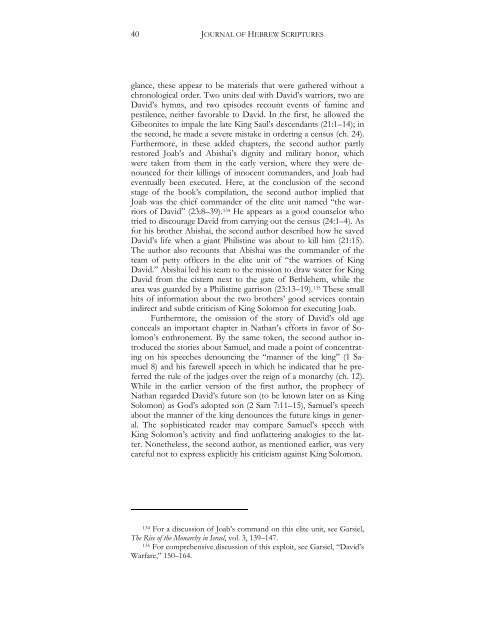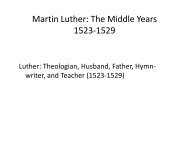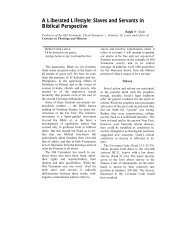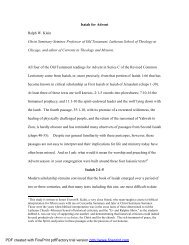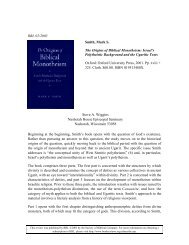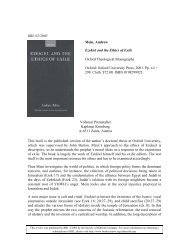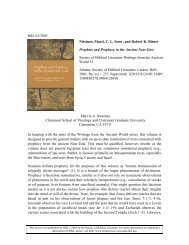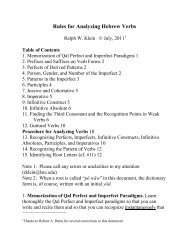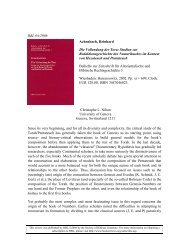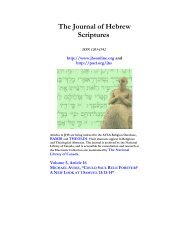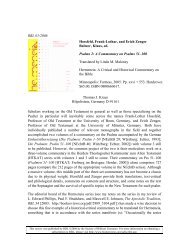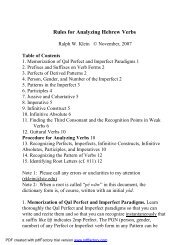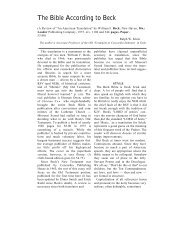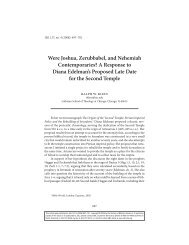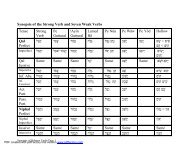The Book of Samuel: Its Composition, Structure and Significance as ...
The Book of Samuel: Its Composition, Structure and Significance as ...
The Book of Samuel: Its Composition, Structure and Significance as ...
Create successful ePaper yourself
Turn your PDF publications into a flip-book with our unique Google optimized e-Paper software.
40 JOURNAL OF HEBREW SCRIPTURES<br />
glance, these appear to be materials that were gathered without a<br />
chronological order. Two units deal with David’s warriors, two are<br />
David’s hymns, <strong>and</strong> two episodes recount events <strong>of</strong> famine <strong>and</strong><br />
pestilence, neither favorable to David. In the first, he allowed the<br />
Gibeonites to impale the late King Saul’s descendants (21:1–14); in<br />
the second, he made a severe mistake in ordering a census (ch. 24).<br />
Furthermore, in these added chapters, the second author partly<br />
restored Joab’s <strong>and</strong> Abishai’s dignity <strong>and</strong> military honor, which<br />
were taken from them in the early version, where they were denounced<br />
for their killings <strong>of</strong> innocent comm<strong>and</strong>ers, <strong>and</strong> Joab had<br />
eventually been executed. Here, at the conclusion <strong>of</strong> the second<br />
stage <strong>of</strong> the book’s compilation, the second author implied that<br />
Joab w<strong>as</strong> the chief comm<strong>and</strong>er <strong>of</strong> the elite unit named “the warriors<br />
<strong>of</strong> David” (23:8–39). 134 He appears <strong>as</strong> a good counselor who<br />
tried to discourage David from carrying out the census (24:1–4). As<br />
for his brother Abishai, the second author described how he saved<br />
David’s life when a giant Philistine w<strong>as</strong> about to kill him (21:15).<br />
<strong>The</strong> author also recounts that Abishai w<strong>as</strong> the comm<strong>and</strong>er <strong>of</strong> the<br />
team <strong>of</strong> petty <strong>of</strong>ficers in the elite unit <strong>of</strong> “the warriors <strong>of</strong> King<br />
David.” Abishai led his team to the mission to draw water for King<br />
David from the cistern next to the gate <strong>of</strong> Bethlehem, while the<br />
area w<strong>as</strong> guarded by a Philistine garrison (23:13–19). 135 <strong>The</strong>se small<br />
bits <strong>of</strong> information about the two brothers’ good services contain<br />
indirect <strong>and</strong> subtle criticism <strong>of</strong> King Solomon for executing Joab.<br />
Furthermore, the omission <strong>of</strong> the story <strong>of</strong> David’s old age<br />
conceals an important chapter in Nathan’s efforts in favor <strong>of</strong> Solomon’s<br />
enthronement. By the same token, the second author introduced<br />
the stories about <strong>Samuel</strong>, <strong>and</strong> made a point <strong>of</strong> concentrating<br />
on his speeches denouncing the “manner <strong>of</strong> the king” (1 <strong>Samuel</strong><br />
8) <strong>and</strong> his farewell speech in which he indicated that he preferred<br />
the rule <strong>of</strong> the judges over the reign <strong>of</strong> a monarchy (ch. 12).<br />
While in the earlier version <strong>of</strong> the first author, the prophecy <strong>of</strong><br />
Nathan regarded David’s future son (to be known later on <strong>as</strong> King<br />
Solomon) <strong>as</strong> God’s adopted son (2 Sam 7:11–15), <strong>Samuel</strong>’s speech<br />
about the manner <strong>of</strong> the king denounces the future kings in general.<br />
<strong>The</strong> sophisticated reader may compare <strong>Samuel</strong>’s speech with<br />
King Solomon’s activity <strong>and</strong> find unflattering analogies to the latter.<br />
Nonetheless, the second author, <strong>as</strong> mentioned earlier, w<strong>as</strong> very<br />
careful not to express explicitly his criticism against King Solomon.<br />
134 For a discussion <strong>of</strong> Joab’s comm<strong>and</strong> on this elite unit, see Garsiel,<br />
<strong>The</strong> Rise <strong>of</strong> the Monarchy in Israel, vol. 3, 139–147.<br />
135 For comprehensive discussion <strong>of</strong> this exploit, see Garsiel, “David’s<br />
Warfare,” 150–164.


